Poverty

The human community exists in perpetual motion; migration is a constant feature of our local and global reality. According to the International Organization for Migration, the total of international migrants increased from an estimated 150 million in 2000 to about 214 million in 2010, and the number of internal migrants (those who move within the borders of a given country) is about 750 million. These relocations are often related to the harsh consequences of war, environmental destruction, and economic downturn. As a result, those engaged in migration often do so for the sake of safety and opportunity, yet these potential rewards are sought in spite of deep personal and financial risk.
While the rates appear to be on the rise, the phenomenon as a whole is by no means exclusive to the present. The New Testament passage often known as “The Parable of the Prodigal Son” includes some of the harsh realities that are often associated with migration. One can examine this well-known parable through the lenses of migration, and in doing so, we are given insights in how to more faithfully extend hospitality to such strangers.
As Luke’s Gospel (15:11-32) reminds us, the youngest of two sons asked for an early inheritance from his father, received it, and then traveled to a “distant country” where he “… squandered his property in dissolute living.” As the term “dissolute” typically intends to describe degenerate and/or sinful behavior, we often conclude that the youngest son was deeply immersed in immorality, thus we find it difficult to feel sympathy when he later falls into the depths of poverty. We tend to perceive the prodigal son as someone who got what he deserved, for as the parable seems to illustrate, not only did he waste the inheritance received from his father, but he did so through sinful choices that brought deep dishonor to his family.

I know I am not the only one who is sick and tired of Washington’s manufactured crises around budget and deficit debates. Brinksmanship has replaced statesmanship in trying to find a sound path to fiscal responsibility. It is time to make the right moral choices that will defend the most vulnerable and pursue an opportunity agenda to reduce the highest poverty rate in 50 years.
Ideological debates over the role of government are the real battle in the nation’s capital — more than the debt crisis. Political calculations about the next election are more important to many of our political leaders than the common good of the country.
It’s just time to move on from the partisan politics that has polarized and paralyzed us for so long — by committing ourselves to moral issues that could and should bring us together. The first will be comprehensive immigration reform, which will change the lives of 12 million people in this country, lift many out of poverty, and help the economy at the same time. This is a clear example of how the faith community has changed, and now come together to become a political game changer in Washington, D.C., at both ends of Pennsylvania Avenue on both sides of the aisle.
And it’s time to make another moral commitment in the midst of our growing economic recovery — to include poor families and change poverty into opportunity. Fighting poverty must not be a partisan issue. When we look at both the causes and the solutions, this battle should bring both liberals and conservatives together. Overcoming poverty, by creating opportunity, happens because of three very basic things that most of us can agree on: family, education, and work. All three are crucial and necessary in moving people out of poverty and into opportunity.
Let’s break it down.

I received a galimoto for Christmas. In case you didn't know, a galimoto is a toy vehicle created out of sticks, cornstalks, wire or anything children can take into their hands and make into a thing with wheels. Mine is a bicycle made of wire. There is a wire child in colorful cloth on the bicycle seat, a rider whose legs pedal as the wheels move. It is beautiful in its simplicity, astonishing in its complexity. It came from the hands of a child in Kenya. I love it.
I brought my galimoto to school and introduced it to my third-grade students. They held it in their hands, marveled at its design, and pushed it around the classroom. "A kid made this?" Matthew asked. "Amazing!"
We looked at a globe and located South Carolina and Kenya. We flew with our fingers from Greenville across the Atlantic Ocean across Africa to Nairobi. We wondered what it would be like to live there. What would the weather be like? What foods would we eat? What kind of house would we live in? What clothes would we wear? What would our school be like? What would our parents do? What would we play with? "I know what we would play with," said Syleana with a smile. "A galimoto!"
We took a picture walk through the book Galimoto written by Karen Lynn Williams and illustrated by Catherine Stock. "What do you notice when you look at the cover of the book?" I asked.
"It looks like the little boy is poor," answered Zaniya.
"Why do you think he's poor?" I continued.

As the Faith Based Organizer for the Federation of Protestant Welfare Agencies (FPWA) — a citywide coalition of more than 300 member agencies and faith institutions — I have the privilege of working with a diverse group of faith leaders. Last spring we were thrust into an important struggle for childcare and after school funding led by the Campaign for Children (C4C), a citywide coalition of organizations advocating for childcare and after school funding. Some may wonder why clergy would be concerned about this issue, but for the clergy I work with, the reason is clear: budgets are moral documents, and what is funded reflects our values. Our clergy know that children are the greatest in God’s kingdom and our investment (or lack thereof) in them will have consequences for our future.
In New York City obtaining quality education is a serious struggle for parents of all classes. This struggle includes waiting lists that upperclass parents place their unborn children on, intelligence test for 5 year olds, interviews and hustling from one open house to another. Finding childcare is a daunting task, especially for low-income parents. As a child in New York City I knew how important it was to not end up at my “zone school,” which are schools for children who could not get in anywhere else. Growing up in one of the 12 poorest communities in New York City, my zone schools were the worst. From junior high on I had to take buses and trains to get an education. The process of finding childcare is one of the clearest depictions of the greatest lie that controls New York City: “that some people are worth more than others” (NYFJ Faith Rooted Organizing Core Lie Exercise March 2011).
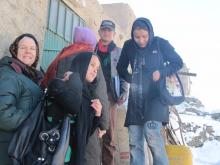
Kabul —Yesterday, four young Afghan Peace Volunteer members, Zainab, Umalbanin, Abdulhai, and Ali, guided Martha and me along narrow, primitive roads and crumbling stairs, ascending a mountain slope on the outskirts of Kabul. The icy, rutted roads twisted and turned. I asked if we could pause as my heart was hammering and I needed to catch my breath. Looking down, we saw a breathtaking view of Kabul. Above us, women in bright clothing were navigating the treacherous roads with heavy water containers on their heads or shoulders. I marveled at their strength and tenacity. “Yes, they make this trip every morning,” Umalbanin said, as she helped me regain my balance after I had slipped on the ice.
About 10 minutes later, we arrived at the home of Khoreb, a widow who helped us realize why so many widows and orphans live in the highest ranges of the mountain. Landlords rent one-room homes at the cheapest rates when they are at this isolating height; many of the homes are poorly constructed and have no pipes for running water. This means the occupants, most often women, must fetch water from the bottom of the hill each and every morning. A year ago, piped water began to reach some of the homes, but that only meant the landlords charged higher rent, so women had to move higher up the mountain for housing they can afford. It only made their daily water-carrying longer and more arduous.

When asked to identify common features of the historical Christmas storyline, many speak of Mary, Joseph, shepherds, wise men, angels, King Herod, and of course, the newborn Jesus. But we too often fail to recognize the social circumstances in which Jesus was born; our understanding of the nativity narrative is too often left incomplete.
In the midst of our various congregational and community Christmas celebrations, we are confronted with the harsh reality that Jesus was brought into the world within a condition of homelessness. As a result, one can argue that we cannot fully commemorate Christmas without recognizing its social setting, for the context of Jesus’ birth points us toward the content and concerns of Jesus’ life.
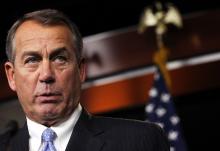
We must be very careful about bringing theological judgments to political ones. Most policy decisions are prudential judgments — compromises between two political parties, neither of which represents the kingdom of God. But sometimes, political ideologies come to a place where they so clearly threaten the well-being of so many and the very foundations of the common good that they must be challenged by theology. This is a moment like that.
Speaker John Boehner’s tax bill that failed, and spending bill that passed in the House yesterday both fail the basic test of protecting the poor and vulnerable. While it does not look like even the spending bill has much of a future, what it portends for the future of the debate is grim.
In three weeks, automatic tax hikes and spending cuts will take effect, potentially triggering a new recession ... unless Congress and the President Obama negotiate a new solution. Long story short, Washington politicians want to cut support for the struggling poor, but protect tax benefits for the wealthy.
 President Obama and Speaker Boehner are negotiating behind closed doors, but the details that have leaked are scary. There's a lot at stake, especially for the most vulnerable members of our society.
President Obama and Speaker Boehner are negotiating behind closed doors, but the details that have leaked are scary. There's a lot at stake, especially for the most vulnerable members of our society.
Cutting programs for the poor, but protecting the wealthy? That's against the very spirit of Christmas.
Speaker Boehner has the power to protect poor and vulnerable people, and he needs to hear from people of faith, especially at Christmas time. Sojourners is calling on Congress and Speaker Boehner to consider the repercussions of their actions. Pray with us as we await this important budget deal.
Right now, this commercial is airing in Speaker Boehner's Ohio district. But we want to spread that message further and ensure everyone in Washington is joining us in a chorus of prayer. Give your year-end gift to help Sojourners get this message out in Washington!

When I go home for Christmas, I always end up pulling out the old Christmas songbook from inside the piano bench and working my way through while my mom cooks dinner. I don’t really read the music as much as I read the chords and play by ear. Good King Wenceslas is a beautiful song musically, but is one of the most fun songs to play because of the never-ending chord changes.
I never really considered what the song was about, being raised in a school system that taught of the tyranny of monarchies and the Revolutionary War. Medieval leaders ruled in an age of knights, castles, and oppressed peasants. But then there was Wenceslas (who I now know was the Duke of Bohemia).

I asked a small group of second-graders what they would like to find inside their mailboxes. That was after we read a story about a goose who opened her mailbox and found a kite. I expected to hear answers of things: video games, toys or basketballs. But the first student who raised her hand looked at me with sincere, big brown eyes and said, "I'd like to find a letter from my dad."
In my classroom, my kids say the profoundest things.
As we entered the holiday season, I thought about the answer that student gave me. I thought about what other of my 7-, 8- and 9-year-olds were saying about the holiday season.
For three years, I lived and worked in a large housing project in Louisville, Ky. I was a middle-class, white graduate student, and my background clouded how I saw the people around me. But I finally began to see clearly.
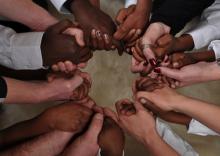
Joey Ekburg, Executive Director of the North Park Friendship Center, was never one to mince words. “We pay almost twice the amount for food, and we have more clients than ever before.” It took awhile for the words to sink in and the math to play out in my head. I was never great at math, but the implications were pretty obvious.
I looked over at the people sitting near the entrance, waiting to pick up food to make it through the week. I wondered what would happen if this food pantry were to run out of food or if the unthinkable were to happen — the Friendship Center suddenly shutting its doors.
The Albany Park neighborhood in Chicago has served as an entry point for generations of immigrant families, including my own. Many of them come to America looking for a fresh start. Sometimes that search becomes reduced to finding a fresh meal.
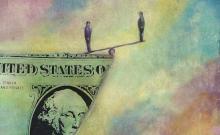
The discussion we are having about “the fiscal cliff” is really a debate about our fiscal soul. What kind of nation do we want to be? We do need a path to fiscal sustainability, but will it include all of us — especially the most vulnerable? It’s a foundational moral choice for the country, and one with dramatic domestic and deadly global implications. It is the most important principle for the faith community in this debate.
I had a recent conversation with an influential senator on these fiscal issues. I said to him, “You and I know the dozen or so senators, from both sides of the aisle, who could sit at your conference table here and find a path to fiscal sustainability, right?”
“Yes,” he said, “we could likely name the senators who would be able to do that.” I added, “And they could protect the principle and the policies that defend the poor and vulnerable, couldn’t they?”
“Yes,” he said, “We could do that too.” “But,” I asked, “Wouldn’t then all the special interests come into this room to each protect their own expenditures; and the end result would be poor people being compromised, right?”
The senator looked us in the eyes and said, “That is exactly what will likely happen.”
It will happen unless we have bipartisan agreement, at least by some on both political sides, to protect the poor and vulnerable in these fiscal decisions — over the next several weeks leading up to Christmas and the New Year, and then for the longer process ahead in 2013.
But for that to be viable, the arithmetic must work.

I learned from an article in The Sun magazine that the word eccentric comes from a Greek word that describes objects in space that don't revolve around the earth. The Greeks in ancient times saw Venus, Mercury, Mars, Jupiter, and Saturn and observed that they wandered through the sky moving in a seemingly aimless way. They called these planets asteres planetai (wandering stars). The planets were not, however, wandering. They were revolving around the sun. It was the finite view of human beings that made them seem like wanderers.
Human eccentrics move in a seemingly aimless way, too. Their movements make them seem like wanderers to other human beings with finite views. They don't wander aimlessly, though. They revolve around a different center.
THE RICH AND THE REST OF US is a stirring call to arms on eradicating domestic poverty. Co-authored by Cornel West and Tavis Smiley, the self-described "poverty manifesto" seeks to convince readers that economic mobility is increasingly difficult for three demographics—the long-term poor, the new poor, and the near poor. Who are the poor in America? According to the Supplemental Poverty Measure, 150 million Americans are at or below twice the federal poverty level, which is $22,040 for a family of four.
Smiley and West invoke Dr. Martin Luther King Jr.'s legacy throughout the book. King's imprimatur legitimizes their attempt to translate the Occupy Wall Street themes of the wealthy 1 percent and the financially fragile 99 percent for a general audience. Interestingly, the book contains a motivational quality reminiscent of self-help books. Each chapter and subsection opens with an inspirational quote or pithy observation. The authors employ statistics, personal anecdotes, poems, and trend analysis to demonstrate the magnitude of poverty in America.
Making poverty history, to use a popular phrase, is an important ideal. To achieve it, we must ask: Who is responsible for eradicating poverty? The co-authors argue that engaged citizens, an active civil society, and a proactive government are the principal agents for helping impoverished families. In several instances, President Lyndon Johnson's War on Poverty represents the promise of the aforementioned three-pronged approach to mitigating the structural causes and personal implications of poverty. From 1964 to 1973, the writers note, the Johnson administration reduced the national poverty rate from 19 percent to 11 percent. Smiley and West successfully contend that government programs play an indispensable role in eradicating poverty.

THE MEDIA UNIVERSE has been dominated for months by election coverage. Meanwhile, out there in America, something has been happening that could, in the long run, be much more significant than any election. The Age of Walmart may be coming to the beginning of its end.
Cracks in the big blue hegemony have been showing up here and there for the past few years. The bribery scandal involving Walmart's Mexican subsidiary did some damage. So have the grassroots campaigns against new Walmart stores in Denver, Miami, New York, and even the college town of Athens, Ga. In Athens, the anti-Walmart banner has been hoisted by the local alt- rock community. Check out "After It's Gone," a music video attributed to Patterson Hood (front man of the legendary Drive-By Truckers) and the Downtown 13.
But all that was just foreshadowing. In October, here and there around the country, the Walmart workforce began to publicly rattle its chains. The movement started in September in the Walmart supply chain, first with strikes by seafood workers in Louisiana, then warehouse workers in Southern California and Elwood, Ill., all of whom went out because of unsafe or inhumane working conditions. Within a month Walmart "associates" had walked out of stores in Dallas, Southern California, the Bay Area, Sacramento, Seattle, Miami, the Washington, D.C. area, and Chicago. Two hundred of these striking workers demonstrated at corporate headquarters in Bentonville, Ark., during the annual meeting of Walmart investors.
"WE DON'T WORK toward justice; we bring about justice through systemic change," says Rev. Cindy Weber, with a fierce and loving smile, when asked how her congregation, Jeff Street Baptist Community at Liberty, seeks justice through reaching out to the community. There is no pride or bravado in her statement, but a firmness that comes from more than 20 years of pastoring a small, community church that actively helps bring about God's peace on earth.
Jeff Street, located in Louisville, Ky., has an active membership of approximately 100 people—a David-sized congregation compared to many mainline or mega-churches. However, the creativity, dedication, and passion of the church's members, manifested in hospitality programs for and with the homeless, have made a giant-sized impact on local economic justice issues. And the congregation didn't stop there; as part of a coalition of area churches, Citizens of Louisville Organized and United Together (CLOUT), the church has made an impression with policy work and community organizing on the state level as well. Jeff Street's commitment to empower poor people has even reached internationally: Members have invested in Oikocredit micro-lending programs to the tune of $180,000.
"We are a church that knows the difference between justice and charity, and also between charity and hospitality," says Weber.
Jeff Street, as members call it, started as the Jefferson Street Baptist Chapel, a worship community that had been meeting for decades at Louisville's Jefferson Street Baptist Center, an outreach to homeless people that is a mission of the Southern Baptist-affiliated Long Run Baptist Association. But when the congregation's head pastor left in 1987 and it promoted Rev. Weber from associate to interim pastor, the move touched off a four-year struggle with the Center's parent organization. The Long Run Baptist Association refused to recognize Weber's leadership because she is a woman—even though, at the time, she was also serving as director of the center. In 1991, the year the congregation installed Weber as permanent pastor, it was told to leave the center. The church kept the name "Jeff Street"—the shortened moniker by which Jefferson Street Baptist Center was known in the nearby Clarksdale housing project and environs—and moved a couple blocks south, into a rehabbed former machine shop on Liberty Street.

In the dark days of Advent, we wonder when the birth pangs will end: Will light break into the darkest corners of our hearts, our families, our lives? Will God—can God—take the twisted sinew of our warped world and redeem it? Will we—can we—hold on through the night? Can we trust that light to come? These are the questions of Advent.
As we enter the season of Epiphany, new questions arise: Will we allow the light that has broken forth to illuminate the darkest corners of hearts, our families, and our lives? Can we—will we—follow Jesus as he untwists the mangled metal of our shattered souls ... and redeems it? Can we—will we—trust the light or will we hide from it? These are the questions of Epiphany.
The light of Epiphany illuminates in two directions: It flashes inward, revealing our twisted and fragmented souls, and it flashes outward, revealing the carnage and consequences of the lies our world has embraced and used to craft public policy, the lies we have believed and reinforced through our complicit acceptance, and the truth we must speak.
As we enter 2013, we look back and see that over the past four years much public good was done. Remember: The Lilly Ledbetter Fair Pay Act made it easier for women to fight pay discrimination. Remember the drama when Congress passed the Affordable Care Act and the Supreme Court upheld it, creating a path for tens of millions of Americans to finally receive health care. Remember the image of the last troops leaving Iraq.

Speaking of the widow’s offering, Jesus says: “Truly, I tell you, this poor widow has put in more than all those who are contributing to the treasury. For all of them have contributed out of their abundance; but she out of her poverty has put in everything she had, all she had to live on.” (Mark 12:41-44)
Today, families across America will gather round tables full of food. They will hold hands and pray. They will give thanks for the blessings that have come to each member over the past year. Some of these families’ tables will be covered with turkeys, stuffing, cranberry sauce, and yams; symbols of abundant blessing. Others will give thanks over Hillshire Farms sliced turkey sandwiches on Wonder bread; symbols of blessing in the midst of hard slog of poverty. Though their tables are bare, their thanks offerings are full of power. For, like the widow’s offering, Jesus reveres the offerings of the poor.
This Thanksgiving, as your family holds hands and give thanks and as your church packs Thanksgiving dinner baskets, and this Christmas season churches prepare gift baskets for those Jesus called “The Least of these” (Matthew 25:40) we at Sojourners ask you to do one more thing: Take five minutes and handwrite a simple letter to your member of Congress.
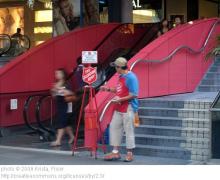
A lot of ink, pixels, and air have been used on the potential effects of the so-called “fiscal cliff.” While many experts say that “cliff” is a misnomer (it’s more of long slope in the wrong direction), there is at least broad agreement that it’s not the right direction for the country’s long-term health.
We’ve heard a lot about the potential effects on Wall Street, our nation’s credit rating, and even the military. But little has been said about the devastating consequences for our nation and the world’s poorest and most vulnerable people — or for the charities and non-profits that serve them.
This week, the Circle of Protection, released an open letter to the president and Congress with a simple message: during the holidays, please “advance policies that protect the poor — not ones that make them poorer.”
Jim Wallis, President and CEO of Sojourners, met with President Barack Obama and other key officials at the White House on Friday to discuss the fiscal cliff, and urge a fair budget deal that does not harm the poor and vulnarable. After the meeting, he sat down with Rev. Al Sharpton on MSNBC's Politics Nation to talk about the results of the meeting.
Visit NBCNews.com for breaking news, world news, and news about the economy